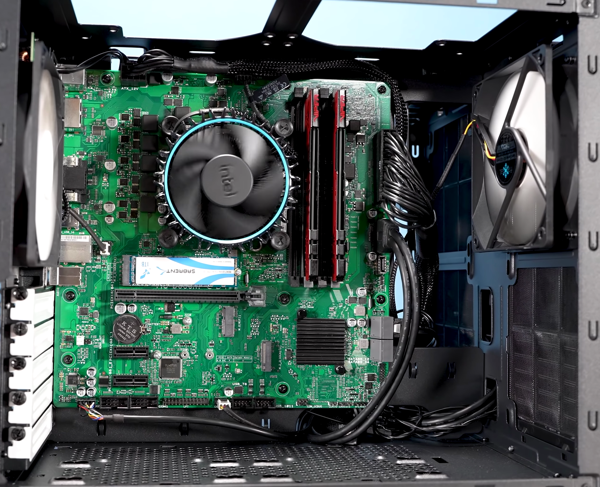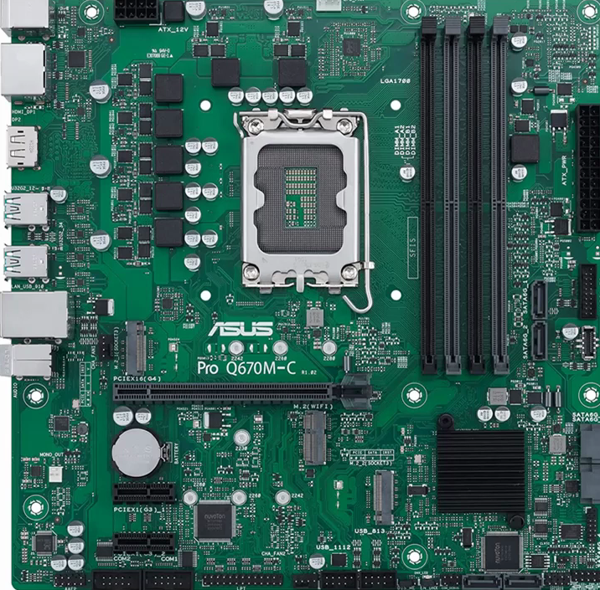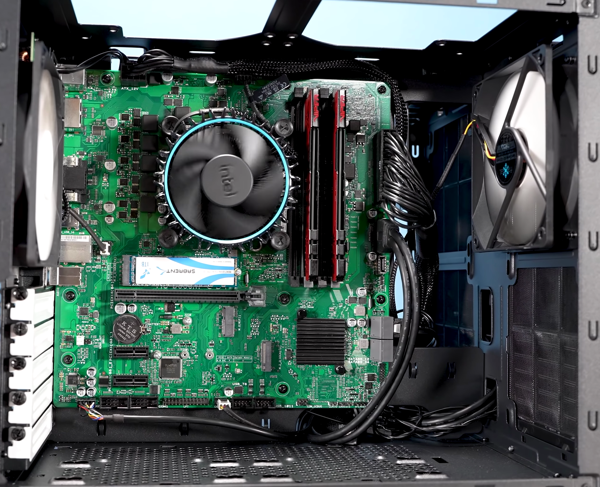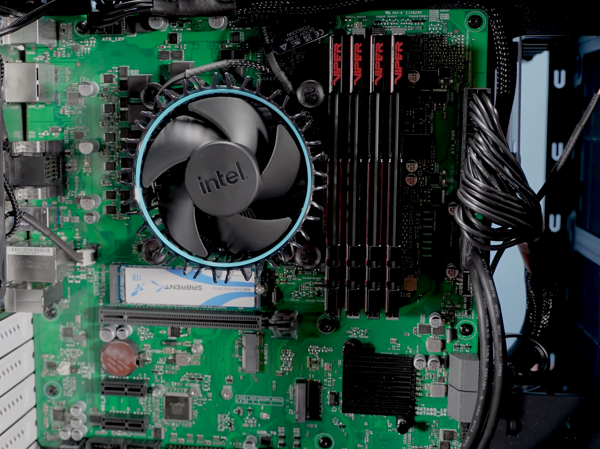Note: As an Amazon Associate we earn from qualifying purchases.
New motherboard: Trying out the ASUS Pro Q670M-C-CSM (2024)
Introduction
I recently used the ASUS Pro Q670M-C-CSM motherboard for a powerful work computer build. This business-focused motherboard advertises some advanced features for professional settings. Below are my thoughts on it.
Specifications
| Property | Value | Property | Value |
|---|---|---|---|
| Brand | NVMe SSD M.2 slots, 4 | CPU Socket | LGA 1700 |
| Compatible Devices | Personal Computer | RAM Memory Technology | DDR5 |
| Compatible Processors | 12th Gen Intel Core | Chipset Type | Intel Q670 |
| Memory Clock Speed | 4800 MHz | Platform | Windows 10 |
| Model Name | PRO | Memory Storage Capacity | 1 GB |
Photos
Click on photos to enlarge them:
Prices
Check prices of the ASUS Pro Q670M-C-CSM Motherboard Black on:
Installing and Updating

When I embarked on setting up the ASUS Pro Q670M-C-CSM motherboard, I anticipated a smooth installation process, considering its feature-rich platform tailored for business-oriented systems. Here’s a quick rundown of the initial steps that were both impressive and a tad troublesome:
Ensure the motherboard’s firmware is up to date before you install a 13th Gen CPU.
Remember that if you’re planning to use a newer CPU, you may need a previous generation processor on hand to update the BIOS.
Appreciate the ASUS-exclusive self-recovering BIOS technology for the peace of mind it brings.
Get ready to handle the ASUS COM debug header and event log features for efficient troubleshooting and system management.
However, while the motherboard boasts compatibility with 12th Gen Intel Core processors, I hit a snag during the update process. To my surprise, the motherboard arrived with older firmware, which proved incompatible with my 13th Gen Intel CPU. The absence of a built-in display for error codes or a system for audible beeps left me troubleshooting in the dark for a moment. To resolve this, I had to source a 12th Gen CPU just to update the BIOS—a step that’s far from ideal and could be frustrating if you’re not prepared for it.
Even though this hiccup was frustrating, ASUS EzFlash did simplify the firmware updating process once I had the appropriate CPU installed. It handily guided me through the necessary steps, including an Intel ME update, to prepare the motherboard for the newer processor.
On a more minor note, I found the lack of a standoff for the NVMe SSD mounting to be a minor, yet annoying oversight. It’s a small component, but essential, requiring me to make an extra purchase, disrupting the flow of my build.
The motherboard’s moisture-resistant coating and commercial BIOS kit certainly add to the durability and customizability aspects, which align with the enterprise-focused positioning of the product. The ASUS Control Center Express also promises to streamline IT operations, an appealing feature for those who manage multiple endpoints.
Despite these positives, the price point did initially make me raise an eyebrow. Is the investment worth it for the features and reliability it claims to offer? Having spent time with the board now, I can lean towards a ‘yes’, especially if enterprise-grade stability and a comprehensive BIOS are high on your priority list.
The installation and updating process for the ASUS Pro Q670M-C-CSM requires a level of readiness, particularly for those looking to employ the latest generation CPUs. It’s a reminder that even with advanced technology at our fingertips, sometimes there are a few manual steps we need to anticipate.
Building the Perfect Rig

Building the perfect rig is a labor of love and precision. When I set my sights on the ASUS Pro Q670M-C-CSM commercial motherboard, I was enticed by its promise of enterprise-level features and enhanced IT operations. The motherboard’s 12th Gen Intel Core compatibility and EVO VPro processors heralded a potent combination of performance and stability, key elements for a seamless computing experience.
Here are the key points in my journey with this motherboard:
Ready for 12th Gen Intel Core processors: Ensuring I have the latest technology at my fingertips was crucial, and this motherboard’s LGA 1700 socket met that requirement.
ASUS-exclusive features: The self-recovering BIOS and COM debug header are lifesavers for efficient troubleshooting. Not worrying about the system BIOs or detailed troubleshooting steps is a relief.
Event log and ASUS Control Center Express (ACCE): Capturing detailed system information and managing IT operations is more accessible than before.
Enhanced durability: An innovative moisture-resistant coating and a commercial BIOS kit speak to the motherboard’s resilience.
However, it wasn’t all smooth sailing. The motherboard not including a standoff for NVME installation was a definite oversight, prompting an additional purchase that, frankly, should have been unnecessary. Also, the flimsy I/O panel left something to be desired, not to mention the initial hiccup I faced with the firmware update needed for Gen 13 Intel processors. These were frustrating setbacks, but once resolved, the performance gains were noticeable.
Interestingly, the motherboard’s DDR5 RAM Memory Technology and memory clock speed of 4800 MHz align perfectly with my speed-intensive tasks. Plus, its compatibility with Windows 10 and 1 GB Memory Storage Capacity make it a solid choice for both work and play.
In mentioning the drawbacks, they were an additional hurdle but not insurmountable. The pros, like the dual M2/NVME drive mounts and a detailed BIOS, tipped the scales back towards a favorable opinion. Every motherboard has its quirks, but the ASUS Pro Q670M-C-CSM balanced its imperfections with reliable performance and innovative features.
As I integrated this motherboard into my system, the strengths became clear. The enterprise-level features certainly smooth out IT operations, and the 24/7 stability speaks to the reliability I was searching for. After countless hours of research and hands-on time, I can affirmatively say that with some patience during setup, this motherboard has become the cornerstone of a robust and highly capable rig.
Reliability and Longevity

Having put together PCs for both work and personal use, I value reliability and longevity above most specs when it comes to motherboards. With the ASUS Pro Q670M-C-CSM, I am impressed with the enterprise-level features it boasts, especially given how critical a stable system is for business operations. Here’s my take on what stands out about this board:
Stability and Reliability: Running 24/7 operations means you need a board that can withstand constant use. The ASUS Pro Q670M-C-CSM, powered by the 12th Gen Intel Core processors, promises exactly that. The reassurance of 24/7 operation is key for any enterprise-level application where downtime equals lost revenue.
System Protection: I appreciate the ASUS-exclusive self-recovering BIOS technology that ensures automatic recovery from backup. This gives peace of mind, knowing that system corruptions can be swiftly resolved without a lengthy troubleshooting process.
Troubleshooting: The ASUS COM debug header and event log features are a huge boon for IT management. Being able to efficiently troubleshoot without added stress is a plus, while the detailed event log helps with system monitoring and security.
Environment Resilience: The innovative moisture-resistant coating caught my attention since it’s not something you find on every board. It’s a welcome addition for anyone who operates in a less-than-ideal environment.
However, it’s not without drawbacks. The absence of an onboard error display means you are flying blind if something goes wrong, and the missing standoff for NVMe installs is an oversight for sure.
Regarding the flimsy I/O panel, it’s an aesthetic issue that does not affect performance but certainly could be improved considering the price point and target market. Despite that, the dual M.2/NVMe drive mounts are valuable for high-speed storage needs, and they gracefully include a mini-slot for Wi-Fi modules.
From an IT management standpoint, the ASUS Control Center Express simplifies endpoint management which is a big win for IT professionals. The system protection and reliability features are at the core of what makes this motherboard an asset for businesses.
Whether you are assembling a PC for intensive workloads or looking for a robust platform to support continuous operation, the ASUS Pro Q670M-C-CSM motherboard delivers on most fronts. Its focus on durability and business-oriented features does justify its position in the commercial motherboard sphere, despite minor misses which I hope will be ironed out in future iterations.
Performance and Customization

Enhancing my workstation with the ASUS Pro Q670M-C-CSM motherboard was largely motivated by its notable feature set and the promise of an elevated enterprise-level experience. On paper, this motherboard is packed with benefits ideal for someone looking for stable and reliable performance, coupled with the extensive management suite ASUS Control Center Express to streamline IT operations. But how does it fare in real-world use? Here are my thoughts:
Processor Compatibility: It’s ready for 12th Gen Intel Core CPUs, but I noticed a snag when considering an upgrade to the 13th Gen. The necessity for a firmware update could be a hassle for those lacking access to a 12th Gen CPU for the update process.
BIOS Technology: The self-recovering BIOS is a practical feature that provides peace of mind, knowing that your system can recover from BIOS corruption.
Diagnostics: The lack of an onboard display for error codes meant more guesswork during setup, which can be frustrating when troubleshooting.
Environmental Resistance: The moisture-resistant coating is a thoughtful touch, especially for those of us in more humid locales or less controlled environments.
So much for the pros; let’s talk about a few cons that caught my attention:
Despite its merits, the absence of an included standoff for NVMe SSD installation was a minor inconvenience, although it was easily remedied.
The quality of the I/O panel left something to be desired, a slight displeasure but not a deal-breaker.
Although not a con for everyone, the price point might give budget-conscious builders pause, particularly when considering the aforementioned hiccups.
For memory and storage, it supports DDR5, with a satisfactory memory clock speed of 4800 MHz, and features four NVMe SSD M.2 slots — a boon for high-speed storage needs. Compatibility runs smoothly with personal computers, and the Intel Q670 chipset offers a solid foundation for a variety of uses.
In conclusion, the ASUS Pro Q670M-C-CSM motherboard presents a mixture of enterprise-level robustness and user-friendly features that, while marred by a few minor issues, provides a typically dependable and flexible foundation for building a capable PC. Its drawbacks, albeit slight, are far outnumbered by the benefits that any serious user or IT professional could appreciate. Those considering it for their next build or upgrade, may find it a worthy investment, despite the need for an initial setup patience and possible additional purchases like the standoff.


